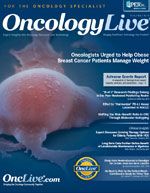Study Adds Pembrolizumab to Paradigm for Certain Head and Neck Cancers
A group of researchers at Washington University in St. Louis recently opened a clinical trial to evaluate pembrolizumab as treatment intensification therapy for patients with high-risk locoregionally advanced, previously untreated, HPV-negative head and neck squamous cell carcinomas.
Ravindra Uppaluri, MD, PhD
Associate Professor, Otolaryngology
Washington University School of Medicine in St. Louis
Surgeon, Siteman Cancer Center at Barnes-Jewish Hospital and
Washington University School of Medicine in St. Louis
St. Louis, MO
Building on the dramatic successes of checkpoint-based immunotherapeutic approaches across a range of cancers, our group at Washington University in St. Louis recently opened a clinical trial to evaluate pembrolizumab as treatment intensification therapy for patients with high-risk locoregionally advanced, previously untreated, HPV-negative head and neck squamous cell carcinomas (HNSCCs).1
These patients exhibit a 5-year overall survival rate of 40% to 50%, which has remained unchanged for years despite advances in surgical innovation, chemotherapeutics, and radiation.2 To improve upon these survival rates, researchers have pursued intensification approaches that involve definitive chemotherapy combined with radiation or as postsurgical adjuvant intensification. We designed a trial incorporating the PD-1 inhibitor pembrolizumab into the surgical management of these cancers.
Rationale for Checkpoint Inhibition
HNSCCs are an optimal disease for checkpoint immunotherapy due to its strong association with long-term tobacco and alcohol use. These carcinogens induce a mutational burden that results in a diverse landscape of neoantigens for immune system-based targeting.3 These characteristics parallel those of non—small cell lung cancer (NSCLC), where pembrolizumab has shown activity in a subgroup of patients.4
Additionally, HNSCCs are accessible for tissue biopsies, enabling powerful correlative studies that can result in a distinct advantage in clinical trial design. Together, the clinical context and mutational burden parallels with NSCLC as well as the tumor accessibility factor provide a strong rationale for pursuing checkpoint-based approaches in patients with HNSCC.
Current Standard
Optimal management for locoregionally advanced, HPV-negative HNSCC patients involves multidisciplinary, patient-centered discussions where nonsurgical and surgical approaches are tailored for each individual. Primary surgery is typically recommended for the oral cavity subsite and in select oropharyngeal, laryngeal, and hypopharyngeal tumors.
When a surgical approach is recommended, postoperative adjuvant radiation is a critical component. Combined cisplatin and radiation is reserved for high-risk patients. These high-risk patients are identified by pathologic exam of resected specimens where either extracapsular extension (ECE) of lymph node metastatic disease or positive surgical margins are present. These high-risk features are correlated with a combined 1-year locoregional recurrence and distant metastatic rate of 35%. Thus, these patients could benefit the most from intensification therapy.5,6
Pembrolizumab Study
The study we have designed is a window-of-opportunity phase II, single-arm clinical trial in which patients would receive pembrolizumab prior to standard-of-care surgery. Treatment intensification for high-risk patients would continue with pembrolizumab therapy after completion and recovery from adjuvant chemoradiation.
The window component of the trial will provide tissue biopsies pre- and post- pembrolizumab treatment for correlative studies to help define responders since one of the key aims of this trial is to identify which HNSCC patients may benefit from immunotherapies.
The primary endpoints of this trial are to assess locoregional recurrence and distant metastases rates at the critical 1-year time point. In addition, the integration of pembrolizumab in the surgical setting has novel implications and we will closely monitor any adverse events that affect surgery.
Finally, important correlative studies will be performed with the tumor biopsies from the window setting and the peripheral blood that will be collected at multiple time points. Together, these data will highlight the impact of pembrolizumab on these high-risk patients and provide valuable insights into possible biomarkers for stratifying responder patients.
References
- NIH Clinical Trials Registry. www.ClinicalTrials.gov. Identifier: NCT02296684.
- Ang KK, Harris J, Wheeler R, et al. Human papillomavirus and survival of patients with oropharyngeal cancer [published online June 7, 2010]. N Engl J Med. 2010;363(1):24-35.
- Schumacher TN, Schreiber RD. Neoantigens in cancer immunotherapy. Science.2015;348(6230):69-74.
- Garon EB, Rizvi NA, Hui R, et al. Pembrolizumab for the treatment of non-small-cell lung cancer [published online April 19, 2015]. N Engl J Med. 2015;372(21):2018-2028.
- Bernier J, Domenge C, Ozsahin M, et al. Postoperative irradiation with or without concomitant chemotherapy for locally advanced head and neck cancer. N Engl J Med. 2004;350(19):1945-1952.
- Cooper JS, Pajak TE, Forastiere AA, et al. Postoperative concurrent radiotherapy and chemotherapy for high-risk squamous-cell carcinoma of the head and neck. N Engl J Med. 2004;350(19):1937-1944.




